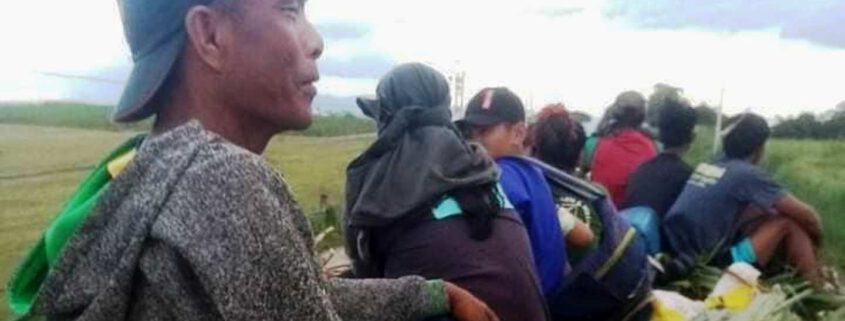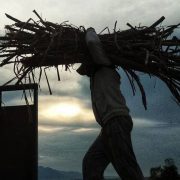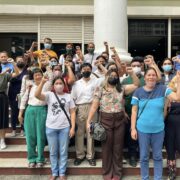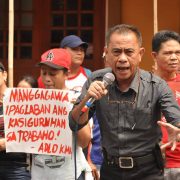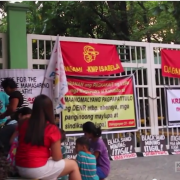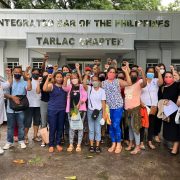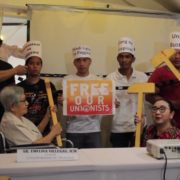Workers complain of ‘slave-like’ labor in Isabela’s sugar cane fields
It is not only in the sugar cane fields of Negros and Panay islands that slave-like labor exists, a farmers’ group revealed.
The Unyon ng Manggagawa sa Agrikultura (UMA) said it exists as well in two of Northern Philippines’ biggest provinces: Isabela and Cagayan.
Hundreds of UMA-Sta. Maria (Isabela) members filed a complaint before the Isabela Provincial Council protesting “slave-like” wages and working conditions in local sugar-cane plantations.
In a statement, the group also condemned lack of benefits and mass lay-offs after several sugar-cane plantations entered into a bio-ethanol production contract with Green Future Innovations-Ecofuel Land Development, Inc. (GFII-Ecofuel) based in San Mariano, Isabela.
The farm workers are employed by sugar-cane plantations located in Sta. Maria and neighboring Sto. Tomas towns in the said province as well as in some municipalities in southern Cagayan province.
UMA said its sugar cane farm workers only receive daily wages of P16-50 for weeding, P40-70 for planting, P150 for fertilizing, P94 for taking care of sugar cane plants and P225-250 for harvesting.
Other kinds of work receive equally meager pay, it added.
More or less 1,695 hectares of sugar cane plantations have entered into the contract with GFII-Ecofuel, UMA said.
Sta. Maria Mayor Hilario Pagauitan owns majority of the plantations in the agreement with 685 hectares, the group said.
UMA said its members previously received P200 daily for various kinds of work in Pagauitan’s sugar cane fields.
The group said the mayor promised to increase his workers’ wages after the 2019 local elections.
The farm workers’ wages have drastically dropped after the elections however as Pagauitan entered into an agreement with the bio-ethanol company, the group said.
“When the contract with GFII-Ecofuel started, 287 workers immediately lost their jobs while the few who were retained are being forced to work in far places,” UMA said in Filipino.
Who is Pagauitan?
Mayor Pagauitan is a currently in his second term as Sta. Maria mayor.
Locally famous for his rags-to-riches story, the local executive earned his fortune as a mining engineer in Indonesia before owning his own mines in Mindanao.
Pagauitan and wife Sophia control East Coast Mineral Resources Co. with rights to a mining prospect in northeast Mindanao.
The mayor is also reported to be very close to entering into a shares-for-asset swap deal with 78 percent of Vulcan Industrial and Mining Corp. owned by the Ramoses of the National Bookstore fame.
He is believed to be worth billions of pesos.
He also owns several other properties, including the famous Agripino Resort. He also owns a helicopter he uses to commute between his hometown and other parts of the country.
Despite his incredible wealth, however, UMA said farm hands in Isabela, including Pagauitan’s, receive the lowest wages among sugar cane hands in the country.
The local executive has yet to respond to Kodao’s request for comment.
Below minimum wage
It in last wage order issued on February 4, 2020, the Cagayan Valley Regional Tripartite Wage and Productivity Board mandated a minimum daily wage of P345.
Section 2 of Wage Order No. RTWPB-02-20 also mandated that the minimum wage should be paid to all workers regardless of their position, designation or employment status.
Section 5 of the order as well said that workers should be paid the minimum wage for eight hours of work or P43.125 per hour for less than eight hours of work per day.
UMA said work in sugar cane fields is very difficult, forcing workers to spend very little time with their families.
“If the workers suffer accidents out in the fields, they receive no medical help. They have no pay slips, sick leave, vacation leave, overtime pay, maternity benefits, death benefits, holiday pay, 13th month pay, SSS benefits and Philhealth,” UMA said.
The workers are not also given personal protective equipment such as boots, gloves, and others, the group added.
“Because of their starvation wages, the workers are hard up in feeding their families and sending their children to school, neglected their health and live abjectly. Their conditions are only made worse by the coronavirus pandemic and the ongoing quarantines,” UMA said.
Isabela and Cagayan are currently among the pandemic hotspots in the country.
UMA said it hopes its litany of complaints will be given due attention in their dialogue with the provincial council today. # (Raymund B. Villanueva)

